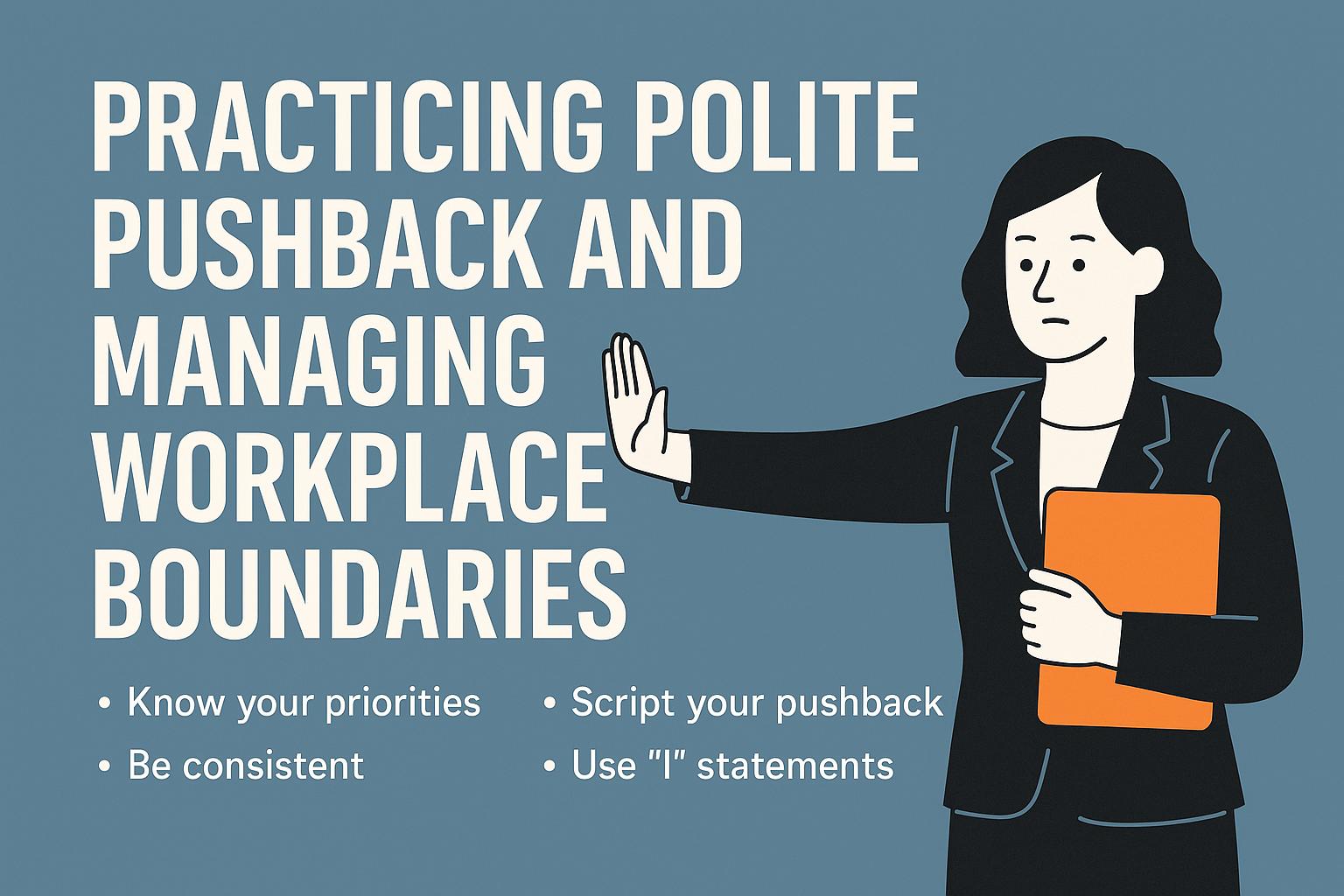This article is part of “pulling back the coaching curtain.” I share different perspectives and lessons learned from coaching work with clients. The topic of identifying and managing workplace boundaries is a topic that frequently arises for my clients ranging from emerging leaders to executives.
Let’s be honest: the workplace would be a lot less stressful if people could read minds. Unfortunately, since no one’s invented telepathy (yet), setting and maintaining boundaries — politely but firmly — is a survival skill. I refer to the process as, “polite pushback.” It isn’t just a fancy phrase to toss into your next meeting. It’s an essential practice that keeps you sane, productive, and stops you from becoming that person who stress-cries into their third cup of coffee by 10 a.m.
Why It’s Important
Polite pushback and boundary-setting create healthier work environments. When you respectfully say “no,” you’re protecting your time, mental health, and ability to actually do your job well. You’re also modeling healthy behavior for your team and coworkers, even if some who currently resemble over-caffeinated squirrels.
Failing to practice polite pushback can lead to a lovely buffet of disasters: burnout, resentment, loss of productivity, and even long-term damage to your career. In fact, research shows that burnout is now officially recognized by the World Health Organization as an occupational phenomenon. Translation: it’s a real problem, not just you being “too sensitive.”
Without good boundaries, you risk being seen as the office doormat. And once that happens, good luck ever getting people to respect your time or your inbox again.
What Happens When We Don’t Do This Well
If you don’t push back or set boundaries, you might experience some of the following symptoms:
- Constantly working late because “it’s just one more thing.”
- Finding out your name is now synonymous with “always available” in group chats.
- Feeling like you’re responsible for things that have nothing to do with your expertise or job title (or your paycheck).
- Gradually losing all passion for your work and fantasizing about running away to live with goats in the mountains.
Not exactly a recipe for thriving, is it?
Plus, when boundaries are missing, team dynamics can get ugly. Toxic work environments often thrive in places where people are too afraid or too unsure how to speak up. Lack of boundaries opens the door for micromanagers, blame games, and those passive-aggressive email wars we all know and loathe.
What Polite Pushback Looks Like in Practice
Polite pushback doesn’t mean huffing dramatically, rolling your eyes, or firing off a “per my last email” masterpiece (tempting as it is). Guilty! However, it’s about communicating clearly, respectfully, and firmly.
Here are a few real-world examples:
Scenario 1: Your Boss Drops a Last-Minute Project on You
Instead of saying:
“Sure, I’ll get right on that while simultaneously cloning myself!”
Try:
“I’d love to help. I’m currently focused on [important project]. Which one would you like me to prioritize?”
(Translation: Something’s gotta give, boss.)
Scenario 2: A Coworker Keeps Asking for Help (Again and Again and Again)
Instead of saying:
“Do I LOOK like the Help Desk?”
Try:
“I’m happy to assist when I can, but I’m tied up with deadlines today. Can we schedule a time later, or have you checked with [insert appropriate resource]?”
You’re not slamming the door. You’re just pointing them politely toward another door. Or, you know, an entire Help Center.
Scenario 3: Getting Pulled Into Meetings You Don’t Need to Attend
Instead of saying:
“This meeting could’ve been an email, Steve.”
Try:
“Thanks for the invite. Could you clarify what you need from me for this meeting? I want to make sure I can add value before committing.”
Sometimes, just asking the question makes people realize you don’t need to be there at all.
Tips for Success
1. Know Your Priorities
If you’re not clear on what matters most, everything will feel urgent. Setting priorities protects your time and makes your pushback stronger. Need help? Check out this guide on prioritization methods from Asana.
2. Script It Out
When you’re new to pushback, winging it can feel like trying to juggle flaming swords. I often work with clients to develop a personal “boundary script.” Script a few polite phrases you can pull out as needed. Having a boundary script ready makes you sound calm and confident instead of pissy or panicked.
3. Stay Consistent
One polite pushback does not a boundary set. Repeat your message consistently. If you’re wishy-washy, people will assume your “no” was just a temporary lapse in judgment.
4. Use “I” Statements
Instead of pointing fingers (“You always dump things on me last minute”), use “I” language (“I work best when I have time to plan ahead”). It’s less confrontational and more effective. PositivePsychology.com has a good breakdown of how to do this well. It’s also a great way to phrase feedback.
5. Practice Outside of Work
Yes, that means telling your friends you can’t help them move on your only free Saturday this month. Setting boundaries in your personal life makes it easier to do it professionally. Remember: you’re not being rude — you’re protecting your ability to do great work and live your life.
If you want a cheat sheet with “Quick Phrases for Polite Pushback” or want to dig even deeper into the fine art of not being a pushover, reach out. I’m happy to chat and see if my coaching can help you improve setting and maintaining boundaries.
About Scott Span, MSOD, CSM, ACC: is CEO at Tolero Solutions. As a people strategist, leadership coach, and change and transformation specialist, his work is focused on people. Through his consulting and training work, he supports clients to survive and thrive through change and transition and create people-focused cultures and a great employee experience. Through his coaching work, he supports people willing to dig deeper to identify and overcome what’s holding them back, change behaviors, accelerate performance, and achieve their goals.
Email | Website | LinkedIn | Twitter | Blog | Facebook| YouTube | Instagram
_______________________________________________________________________
*All Rights Reserved. Reproduction, publication, and all other use of any of this content is prohibited without the authorized consent of Tolero Solutions and the author.






